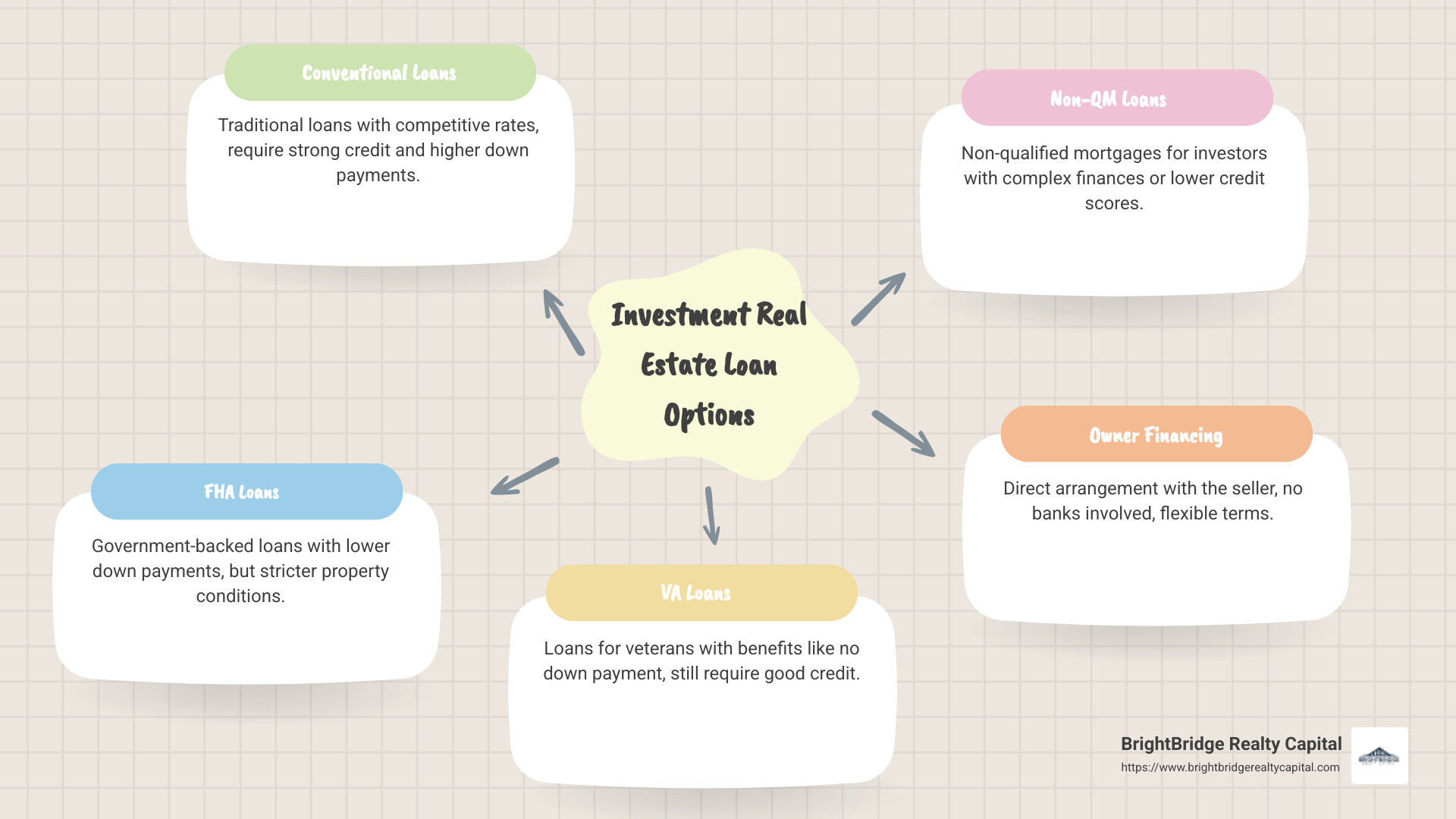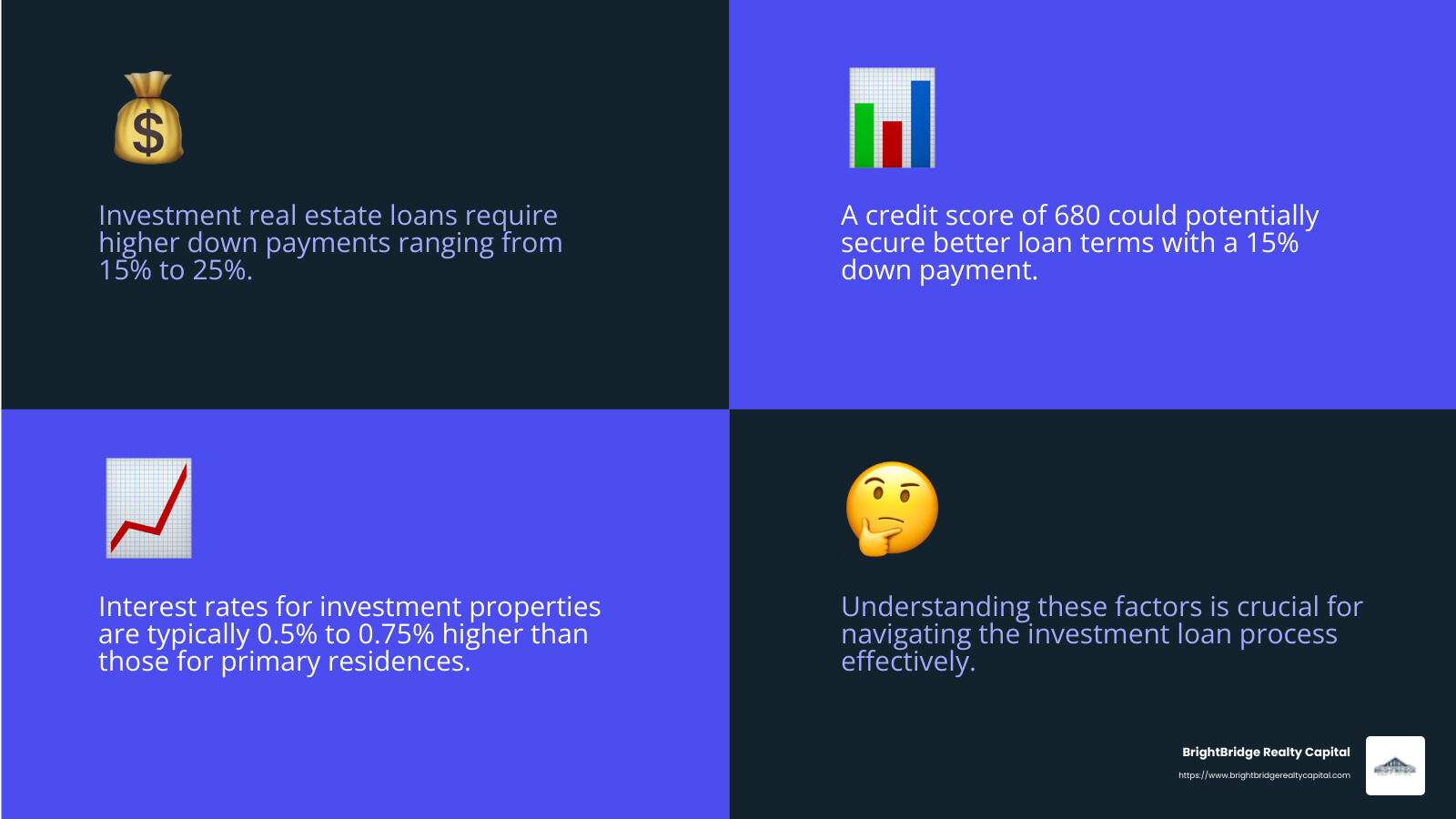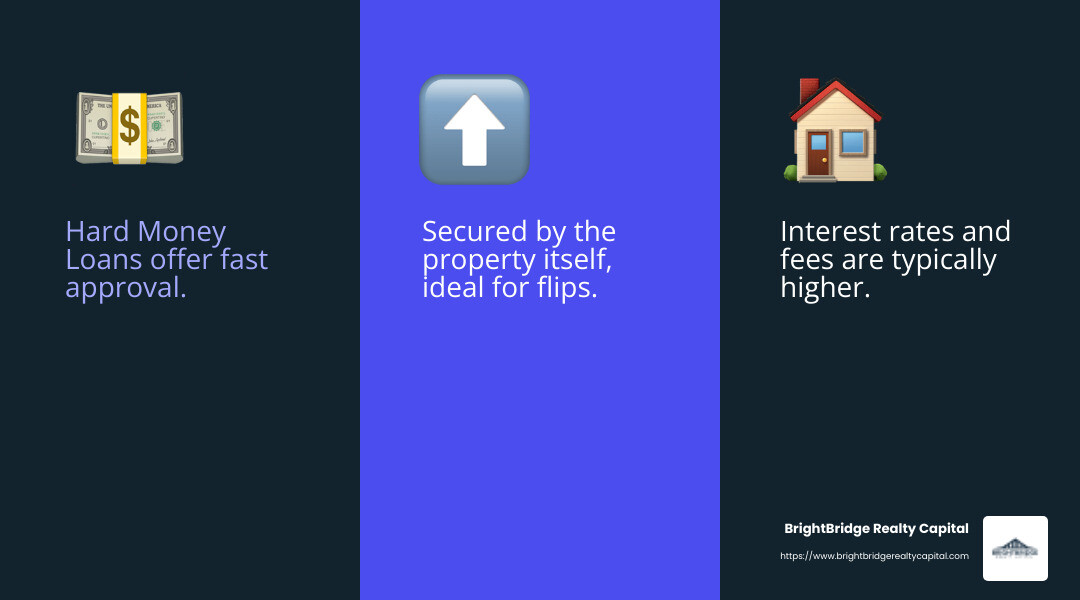Investment Real Estate Loans: The Key to Property Investment Success

Investment real estate loans are the fuel for real estate investors aiming for success. Whether you're looking to expand your rental portfolio or finance a fix-and-flip project, understanding your financing options is crucial.
Quick Takeaways:
- Investment real estate loans let you invest in property by borrowing money.
- They come with higher interest rates and stricter requirements compared to loans for primary homes.
- Options include conventional loans, FHA loans, and alternative methods like hard money loans.
In real estate investment, having clear financing options isn't just beneficial; it's essential. Real estate, one of the world's oldest asset classes, offers a unique blend of income, appreciation, and diversification. However, choosing the right loan can often feel like navigating a complex maze.
At BrightBridge Realty Capital, we recognize the challenges investors face with traditional lending slowdowns and crowded application processes. The right loan option—custom to your investment goals—can turn potential roadblocks into stepping stones for building wealth.
Our mission is to simplify financing by offering competitive rates and quick, flexible loan approvals. This empowers you to seize investment opportunities when they arise.
To streamline this journey, we'll explore different types of loans, assess their risks and benefits, and offer insights to help match your investment strategy with the right financial tool.
Ready to find which investment loan can best support your real estate ambitions?

Understanding Investment Real Estate Loans
Investment real estate loans are a key piece of the puzzle for anyone looking to invest in property. While they offer great opportunities, they also come with some unique challenges. Let's break down the essentials so you can make informed decisions.
Higher Down Payments
When it comes to investment properties, lenders typically require higher down payments compared to primary residences. For example, you might need to put down at least 15% to 25% of the property's value. This acts as a buffer against the increased risk that comes with investment properties. The higher the down payment, the lower the risk for the lender, and this can sometimes lead to better loan terms for you.
Stricter Credit Requirements
Your credit score plays a crucial role in securing an investment real estate loan. Lenders often expect higher credit scores for these loans. For instance, a minimum score of 620 might be required with a 25% down payment, while a score of 680 could suffice with a 15% down payment. A strong credit score not only helps you qualify but can also lead to more favorable interest rates.
Risk-Adjusted Interest Rates
Investment properties are considered riskier than primary residences. As a result, they usually come with higher interest rates. Expect rates to be about 0.5% to 0.75% higher than those for a home you live in. This compensates lenders for the added risk. Even a small difference in interest rates can significantly impact your monthly payments and overall loan cost.

Navigating the Loan Process
Understanding these factors is crucial to navigating the investment loan process. At BrightBridge Realty Capital, we aim to simplify this journey by offering competitive rates and flexible terms custom to your investment strategy. Whether you're eyeing a rental property or planning a flip, knowing these basics will help you align your financial goals with the right loan product.
In the next section, we'll dive into the different types of investment real estate loans available to you.
Types of Investment Real Estate Loans
When it comes to investment real estate loans, there are several options to consider. Each type has its unique features, benefits, and requirements. Let's explore the most common types:
Conventional Loans
Conventional loans are the go-to choice for many real estate investors. These loans are not backed by the government, which means they often have stricter credit requirements and higher down payments. Typically, you'll need a credit score of at least 620 and a down payment ranging from 15% to 25% of the property's value.
The upside? Conventional loans offer flexibility and are widely available, making them a popular choice for seasoned investors.
FHA Loans
Federal Housing Administration (FHA) loans are a bit different. They're primarily designed for homeowners, but you can use them for investment properties if you plan to live in one of the units. This is a great option if you're interested in "house hacking"—living in one unit while renting out the others.
FHA loans require lower down payments, sometimes as low as 3.5%, but you must live in the property for at least 12 months. This makes them a more accessible option for first-time investors.
VA Loans
U.S. Department of Veterans Affairs (VA) loans are exclusively for eligible military service members, veterans, and their families. These loans can be used to purchase properties with up to seven units, as long as you occupy one of them. VA loans often require no down payment and offer competitive interest rates.
For those who qualify, VA loans are an excellent way to enter the real estate investment market with minimal upfront costs.
Non-QM Loans
Non-Qualified Mortgage (Non-QM) loans are designed for investors who don't meet the standard income or documentation requirements of conventional loans. These loans are more flexible but usually come with higher interest rates and larger down payments.
Non-QM loans are ideal for investors with unique financial situations, such as self-employed individuals or those with irregular income streams.
Owner Financing
Owner financing, also known as seller financing, involves the property owner acting as the lender. This option can be beneficial if you have trouble qualifying for traditional loans. The seller and buyer agree on the terms, which often include a balloon payment due within five to ten years.
While owner financing can offer flexibility, it may come with higher interest rates and requires careful legal consideration.
Understanding these loan options can help you choose the best fit for your investment strategy. In the next section, we'll explore alternative financing options that can further expand your possibilities.
Alternative Financing Options
When traditional investment real estate loans don't quite fit your needs, alternative financing options can offer flexibility and unique benefits. Let's explore some of these options:
Home Equity Loans and HELOCs
If you already own a home, tapping into your property's equity can be a smart move. Home Equity Loans let you borrow a lump sum against your home's equity, typically at a fixed interest rate.
On the other hand, a Home Equity Line of Credit (HELOC) works more like a credit card. You can borrow as needed, up to a certain limit, and only pay interest on what you use. This can be particularly useful for ongoing projects or phased investments.
Both options allow you to leverage your existing home equity, potentially offering lower interest rates compared to other types of financing. However, be cautious: if you can't repay, you risk losing your home.
Cash-Out Refinance
A Cash-Out Refinance allows you to replace your existing mortgage with a new one at a higher amount, pocketing the difference in cash. This can provide significant funds for purchasing or renovating investment properties.
While this option can offer better rates than personal loans or credit cards, it also increases your mortgage balance and monthly payments. It's crucial to ensure the investment will generate enough return to cover these costs.
Hard Money Loans
Hard Money Loans are a popular choice for real estate investors who need quick cash. These loans are typically provided by private investors or companies and are secured by the property itself.
They are ideal for short-term projects like house flipping, offering fast approval and flexible terms. However, they come with higher interest rates and fees, reflecting the increased risk for lenders.

Choosing the Right Option
Each of these financing options has its own set of advantages and risks. Your choice will depend on your financial situation, investment goals, and risk tolerance.
- Home Equity Loans/HELOCs: Best for those with significant home equity and a stable financial situation.
- Cash-Out Refinance: Suitable for investors looking to leverage their primary residence for investment purposes.
- Hard Money Loans: Ideal for experienced investors needing quick funding for short-term projects.
By understanding these options, you can make informed decisions to finance your investment properties effectively. In the next section, we'll explore the benefits and risks associated with investment real estate loans.
Benefits and Risks of Investment Real Estate Loans
Investment real estate loans can be a powerful tool for building wealth, but they come with their own set of benefits and risks. Let's break it down.
Benefits
Steady Cash Flow
Investment properties can provide a consistent stream of rental income. This cash flow can help cover mortgage payments and other property expenses. For example, in a thriving rental market, your property might bring in enough rent to not only cover costs but also generate additional income.
Property Appreciation
Real estate has a history of appreciating over time. In the U.S., home prices have increased by over 5.5% annually since 1963. This means your investment could grow in value, leading to significant capital gains when you decide to sell.
Tax Benefits
Owning investment properties can offer several tax advantages. You can deduct mortgage interest, depreciation, and maintenance costs, reducing your taxable income. Additionally, strategies like 1031 exchanges allow you to defer capital gains taxes when reinvesting in new properties.
Portfolio Diversification
Adding real estate to your investment portfolio can provide diversification. Real estate values often move independently of stocks, potentially offering stability during market downturns. This can help balance risk across your investments.
Leverage
One of the biggest advantages of investment real estate loans is the ability to leverage. You can control a high-value asset with a relatively small down payment. As tenants pay rent, you build equity and can achieve a healthy return on investment, even if the property's value remains steady.
Risks
While the benefits are enticing, there are also risks involved.
Market Fluctuations: Real estate markets can be volatile. Economic downturns may lead to decreased property values and rental income.
Higher Costs: Investment loans often come with higher interest rates and down payment requirements compared to primary residence loans. This can strain your finances if not carefully managed.
Maintenance and Management: Owning rental properties isn't entirely passive. You'll need to handle maintenance, tenant issues, and comply with local regulations. Alternatively, you could hire a property management company, which adds to expenses.
Understanding these benefits and risks can help you make informed decisions about financing your real estate investments. In the next section, we'll tackle common questions about investment real estate loans.
Frequently Asked Questions about Investment Real Estate Loans
What is the minimum down payment required?
When it comes to investment real estate loans, the down payment is typically higher than for a primary residence. Most lenders require at least 15% to 25% down. For instance, if you're purchasing a multifamily home using an FHA loan and plan to live in one of the units, you might get away with as little as 3.5% down. However, a conventional loan for an investment property usually demands at least 20% down.
A larger down payment reduces the lender's risk and can also lead to better loan terms. If you're short on cash, consider using gift funds from family or friends, as permitted by some loan programs, to boost your down payment.
How does credit score affect loan eligibility?
Your credit score plays a crucial role in determining your eligibility for investment real estate loans. A minimum score of 620 is generally needed for a conventional loan, but a higher score often means better interest rates and loan terms. For example, a score of 740 or above can significantly improve your chances of securing favorable terms.
If your score is below the desired level, consider taking steps to improve it before applying. Paying down existing debt, making timely payments, and correcting any errors on your credit report can help boost your score.
Can rental income be used to qualify for a loan?
Yes, rental income can be a valuable asset when qualifying for an investment real estate loan. Lenders often allow you to include up to 75% of expected rental income when calculating your debt-to-income (DTI) ratio. This can help improve your eligibility by showing you have additional income to cover the mortgage payments.
To use rental income in your application, you may need to provide documentation such as current leases or a rental history. Some lenders might also require tax returns showing rental income from previous years. This additional income stream can make a significant difference in your loan approval process.
By understanding these key aspects of investment real estate loans, you can better steer the financing process and make informed decisions about your real estate investments.
Conclusion
Navigating investment real estate loans can be complex, but with strategic planning and the right partner, it can lead to substantial returns. At BrightBridge Realty Capital, we specialize in providing custom financing solutions that align with your investment goals. Our quick and flexible funding options are designed to help you seize opportunities without delay.
Strategic Planning
Successful real estate investment is not just about finding the right property; it's about securing the right financing. Strategic planning involves understanding your financial position, setting clear investment goals, and choosing the right loan product. By analyzing factors like interest rates, loan terms, and eligibility criteria, you can make informed decisions that maximize your returns.
Maximizing Returns
To maximize your investment returns, it's crucial to leverage the benefits of investment real estate loans. These loans offer opportunities for property appreciation, steady cash flow, and tax advantages. With BrightBridge Realty Capital, you can take advantage of competitive rates and fast closings, often within a week, ensuring you don't miss out on lucrative deals.
By partnering with us, you gain access to a seamless loan process and expert guidance every step of the way. Our direct lending approach eliminates intermediaries, providing you with the best possible rates and a hassle-free experience.
Ready to take the next step in your real estate investment journey? Explore our loan options at BrightBridge Realty Capital and find how we can help you achieve your investment goals.


